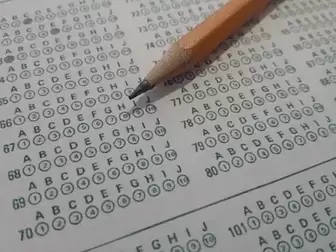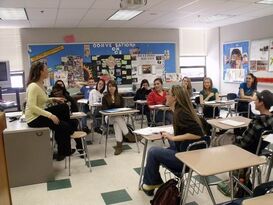|
3/5/2020  If you've read some of my other posts you know I value planning as a way to keep students academically engaged during class time. Making the time for "proper prior planning" is my PRIORITY! Unfortunately, finding the time necessary while at school is nearly impossible. This blog post (with video attached) is about how my "proper prior planning" is disrupted by meetings that I (and other public school teachers) are expected to attend. Read on or watch my video below!  Let’s start off with my district calendar. All teachers are contractually required to attend both faculty and department meetings every month. Both typically occur on a set day of the month from 3-4 pm, after school. Although attendance at these meetings has always been required, my district became more stringent about faculty being there in the early 2000s. These days, we must sign in. Attendance counts as district sponsored (state mandated) continuing education. During faculty meetings an administrator usually talks about our graduation rate or what “accommodations” we need to make so that more students “will be successful”. We are told to give students “breaks” and send students to the administrative suite to process their feelings and get snacks during class. I have been present during faculty meetings prior to January or June regents exams where the administrator told teachers that if they didn’t have the test papers and pens ready for students when they arrived to take their test, the students would be so crushed and demoralized (I’m paraphrasing here) that they would perform poorly on their test. Time during faculty meetings has also been devoted to public recognition of staff members who have volunteered time to organize donation pantries, holiday stores, or free dinners for night school students, or other unpaid activities at the behest of administration.  As a special education science teacher, I attend special education and science meetings on alternating months. Some science meetings are devoted to “data driven instruction” or DDI. That’s where we discuss the questions that students got wrong on the district mandated common assessment tests. We analyze why students got the questions wrong and how we can re-teach the material so that students understand the concept better.  The impracticality of this district directive is that, by the time the DDI meeting occurs, the class has moved on to the next unit. After a unit is taught, the next logical time for review is right before June regents exams. The school year affords only a few weeks spent on each topic because of the breadth of the curriculum. Further, students who miss a lot of regents questions are either poor readers or concrete thinkers, or both.  Barring a learning disability, poor reading skills may be a function of lack of independent reading, lack of reading in the home, and lack of reading practice in prior schooling. Immature learners, regardless of age, may be concrete thinkers due to their having had limited stimulation with different concepts or their implications, or limited exposure to varying situations. Both poor reading skills and concrete thinking seen in high school students are developmental delays. Low income students are twice as likely to experience developmental delays as their higher-income peers (https://www.acf.hhs.gov/ecd/child-health-development/watch-me-thrive). Since 53% of my district’s students qualify for free or reduced lunch, this socio-economic reality is outside the scope of a teacher’s practice and, therefore, not able to be addressed with simply re-teaching a concept such as dynamic equilibrium or passive transport. But, yet, we are required to meet monthly to discuss how we can better teach this material to our students.  The months I don’t go to a science department meeting, I am supposed to attend a special education meeting. There we are told to write more informative Individualized Education Plans (IEPs). We are supposed to frame our descriptions positively and focus on student’s strengths. We are told to be specific about their academic functioning levels.  Special education teachers are departmentalized at my high school. We typically work with students forty to eighty minutes a day. Each special ed teacher teaches their subject, yet is expected to be able to write fluently about each of their “tracking student’s” math, writing, and reading skills. We are also supposed to know our students’ academic or work plans after high school.  For the past several years, much Special Ed meeting time has been spent bemoaning the fact that the district does not have a person employed as a Transition Coordinator that will gather student data about college or work after high school. Of course, meetings also get filled with discussion about regents testing weeks in January and June. We get told to make sure students answer all questions on their tests, and sign their answer sheets, color in their “bubbles” with the right color ink, and so on. This is all very important because if a student leaves the testing room and has not signed his answer sheet or used the wrong ink on the answer paper---watch out! It is not the student’s error for not following directions. It is the teacher’s error for not being a caring and attentive proctor! (Check out this video about nasty emails that describes what happened to me when I was accused of such a heinous act ; o )  Maybe you think that two meetings a month is not so bad. For myself, the problem is less about having to attend a meeting, but rather, having to listen to a person in authority bolster ideas that have no place in education and castigate methods that encourage learning and foster student responsibility. In addition to the faculty and department meetings, a teacher in my building thought it would be a good idea for teachers that teach special ed classrooms to get together and talk about their students. Those meetings happen during 9th period, a time when teachers are supposed to be available for their students to get extra help.  Even though I believe that it is more important for me to be in my classroom for my students, I have been told that it is not collegial to skip these meetings. During these meetings we discuss our common students who are struggling. Not much changes after we discuss them, but discuss them, we do! I am also required to attend the Committee on Special Education (CSE) meetings for my “tracking students”. These are to discuss programming for the following year. The finalized Individualized Education Plant (IEP) is completed during this meeting. It is a legal document that the district is supposed to follow with regard to the instruction of the student described in the document.  As a legal document, it could be used as a cudgel by a wily attorney checking to see if a district is following its responsibility to educate students in the least restrictive environment. Most of the time, in practice, it says little of value that can be used in the classroom day-to-day. In addition to the aforementioned meetings, there are also Parent-Teacher Conferences (PTCs), which may be set up by the guidance counselor. PTCs follow no particular schedule and usually amount to a “pep-talk” for the embattled student. They occur any time the parent can come in, but usually activity period. I usually attend these with a print-out of the student’s grades. Hopefully this post gives you some idea that, in public education, you need to find time wherever you can to complete your “proper prior planning” because, if you work in a school district like the one I’ve been in for many decades, your out-of-classroom time will be monopolized by meetings of little value.  If you are a teacher, is your meeting schedule anything like mine? Share your thoughts below.
1 Comment
|
AuthorGertrude Katz has spent over 30 years teaching K-12 public school students all major subjects. She has taught biology and education at the college level. The majority of her career has been spent instructing biology at the secondary level. Categories
All
|


 RSS Feed
RSS Feed